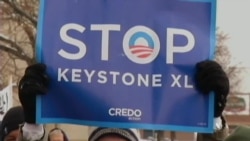Top officials with the U.S. oil industry are urging Congress and the president to approve a controversial oil pipeline that would bring crude from Canada to refineries on the U.S. Gulf coast.
The industry says the Keystone XL Pipeline would create thousands of jobs. Environmentalists say this project would create more pollution than usual and is not needed at a time of oil abundance. The new business-friendly Republican majority in the Senate favors the project, but White House officials say President Obama, a Democrat, may veto the program.
The Keystone Pipeline would move 800,000 barrels of oil a day from Canadian tar sands across the United States to refineries on the Gulf Coast.
Advocates say the pipeline would boost the U.S. economy and create 42,000 jobs during the two-year construction process.
The head of the American Petroleum Institute, Jack Gerard, is disappointed that Obama has said he will not approve the Keystone bill, if it passes Congress.
"The needlessly protracted fight over the Keystone XL pipeline only deprives tens of thousands of hardworking Americans of well-paying jobs and our nation of a safe and efficient means of transporting much needed North American energy resources," he said.
At a December news conference, Obama said he doubts Keystone will produce anywhere near the number of jobs promised and do little to boost the economy.
"I think that there’s been this tendency to really hype this thing as some magic formula to what ails the U.S. economy, and it’s hard to see on paper where exactly they’re getting that information from,” he said.
Critics say tar sand petroleum causes more environmental damage than other kinds of oil and say it should be left in the ground.
"You essentially have to do a strip-mining operation, where you’re scooping this tarry, oily earth out of the ground and putting it into very large chemical processing facilities that use enormous amounts of electricity and water," said Tyson Slocum, who speaks for advocacy organization Public Citizen.
The new Republican majority in the Senate put approving the Keystone pipeline on its agenda on the first day of the new session.
Keystone supporter Senator John Hoeven introduced a bill to approve the project and vowed quick action on the measure.
“It's about growing our economy, it's about national security, It really is about building the infrastructure we need -- pipelines, roads, rail, transmission,” he said.
Keystone has been the target of many protests and skepticism by the president. But it now seems to be moving forward in the Congress. But its fate may ultimately hinge on the falling price of oil, which might eventually make the relatively expensive tar sands products unprofitable.





